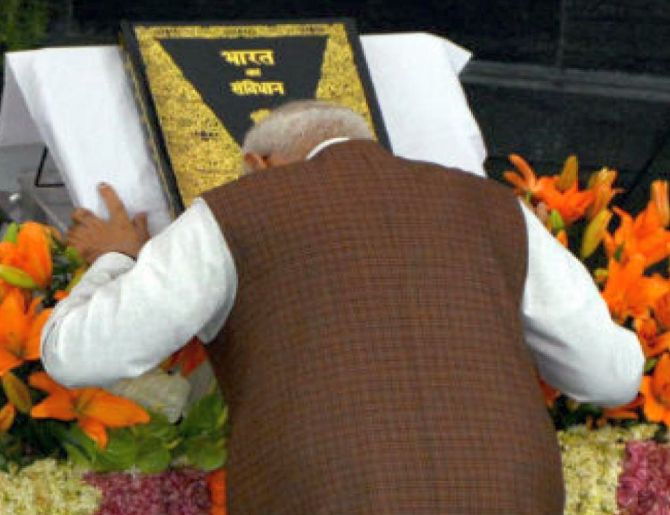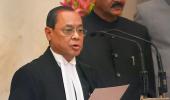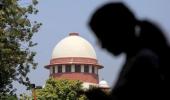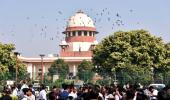'The right conferred by Article 32 has been considered as a part of the 'basic structure of the Constitution', and thus cannot be taken away by anybody, not even by amending the Constitution.'

The recent legal drama over the arrest of Arnab Goswami, CEO, Republic TV, by the Maharashtra police in connection with an abetment to suicide case and his subsequent bail hearing in the Supreme Court brought into focus the application of Article 32 of the Constitution that provides for the protection of fundamental rights.
The role of Article 32 came into play when Chief Justice of India Sharad Arvind Bobde, in the hearing into the habeas corpus petition filed by the Kerala Union of Working Journalists seeking the release of journalist Sidhique Kappan from custody, orally observed (external link) that the Supreme Court was 'trying to discourage Article 32 petitions'.
However, in the Arnab Goswami bail hearing, Supreme Court Justice Dr D Y Chandrachud observed that the citizens have a fundamental right to approach it under Article 32, creating a controversy about when an Indian citizen can or cannot approach the Suprme Court under Article 32.
To know more about Article 32, and various other judicial remedies available to Indian citizens to protect their fundamental rights in accordance with the Constitution of India, Prasanna D Zore>/Rediff.comAbhay Thipsay, a former judge of the Bombay and Allahabad high courts.
In the first of a two-part interview, Justice Thipsay, who recently joined the Indian National Congress, also discussed the independence of the judiciary and how it is a function of will and understanding of the political executive.
Dr Babasaheb Ambedkar referred to Article 32 as the most significant Article in the Constitution. He called it the 'very soul and heart of it…' How relevant is what Dr Ambedkar said about Article 32 in India today?
Undoubtedly, what Dr Ambedkar said then is as relevant today as when he said it. Maybe today the need to approach the Supreme Court for protection of one's fundamental rights and liberty is more due to the rise of communalism, majoritarianism and intimidation of liberal thought.
Today liberal thought is giving way to 'majoritarian might'.
Dr Ambedkar referred to Article 32 as the 'most significant single Article' because it makes the citizen's right to move the Supreme Court for the protection of their fundamental rights, itself a fundamental right.
The Supreme Court is the guardian of the Constitution. The Constitution lays down what fundamental rights every citizen shall have, and makes it clear that no law can be enacted by the legislature so as to take away or abridge the fundamental rights; and that, any such law, if enacted, would be void to the extent of the contravention of the relevant provision.
Article 32 speaks of the 'Right to Constitutional remedies' which is clear from the headnote to the said Article.
The right conferred by Article 32 has been considered as a part of the 'basic structure of the Constitution', and thus cannot be taken away by anybody, not even by amending the Constitution.
Considering the socio-religious milieu and intimidation of liberal thought and attacks on personal liberty -- which amount to serious and brazen violation of fundamental rights -- what Dr Ambedkar said is more relevant today.
Under what circumstances can petitions under Article 32 be discouraged?
I do not know what was actually remarked by the Chief Justice of India, but of course, I have read reports in the print media attributing such utterances to the Chief Justice of India.
The petitions under Article 32 cannot be 'discouraged' even by the Supreme Court, because doing so (filing petitions) under Article 32 is a fundamental right.
If we see the wording of sub-article 1 (of Article 32), it speaks about the right to move the Supreme Court 'by appropriate proceedings'. Now, what are the 'appropriate proceedings', will ultimately be decided by the Supreme Court.
Sometimes the form of the proceedings may not be proper; in which case the Supreme Court may not entertain such petitions or applications. But there is no other way of preventing or 'discouraging' people from approaching the Supreme Court for the protection of their fundamental rights.
If you see Article 33, it empowers the Parliament to modify the fundamental rights in their application to the members of the armed forces, members of forces charged with the maintenance of public order, etc, and restricts the application of such rights so as to ensure proper discharge of their duties and maintenance of discipline among them.
So, whenever the makers of the Constitution thought it permissible to modify and restrict the application of the fundamental rights (which would include even the right to move the Supreme Court), in particular cases, or with respect to a particular class, the Constitution has specifically provided so.
Wherever the Constitution makers thought that fetters may be allowed to be put on enforcement of these fundamental rights, they have done it. Even then, the fetters put must qualify as 'reasonable restrictions' and judicial review of such fetters by the Supreme Court is permissible.
Doesn't this 'reasonable restriction' clause make the exercise of fundamental rights under Article 32 discretionary?
No. The reasonable restrictions can be put by making an appropriate law and not otherwise.
Moreover, the concept of reasonable restrictions is found only in Article 19 and the view of the judicial authorities is that, the concept of reasonable restrictions comes in picture only with respect to the fundamental rights as mentioned in that Article, that is, freedom of speech and expression, to assemble peaceably and without arms, etc.
Thus, where it involves the breach or violation of any fundamental rights, a citizen has the right to move the Supreme Court and there would be no question of Supreme Court's 'discretion' in that regard.
In fact, it has been held that irrespective of the existence of an alternative remedy, if there is a case of clear and gross violation of a fundamental right, a citizen can straight away move the Supreme Court.
The Supreme Court has got discretion to entertain such petitions or applications even when there is alternative legal remedy for the enforcement of such rights.
Under what circumstances can an individual approach the high courts and Supreme Court for protection of fundamental rights under Article 32?
The high court's jurisdiction is much wider under Article 226.
Petitions can also be filed before the high court by virtue of Article 227 which provides for superintendence and control by the high courts over the judicial tribunals within its territorial jurisdiction.
The jurisdiction under Article 226 is called writ jurisdiction. Article 227 is also used in a way similar to the writ jurisdiction.
Article 32 applies only to the Supreme Court of India.
If we go into legal technicalities, there are subtle differences between Article 32 and Article 226, but these are broadly called writ jurisdiction. Article 32 is not as widely worded as Article 226.
Under Article 32, the right to approach the Supreme Court of India is only for the enforcement of the rights conferred by Part III of the Constitution, that is, fundamental rights.
For exercise of Article 226 there is no such rider.
Moreover, if you approach the high courts under Article 226 and suppose you fail, then you can also file appeal against that order by approaching the Supreme Court of India.
The right to approach the Supreme Court arises in many ways. It can be by way of an appeal from a decision given by the high court or you may also directly approach the Supreme Court of India where no appeal is provided, or even when some remedy is available, but one claims that it is not efficacious, it is time consuming etc.
The Supreme Court cannot question you for approaching it directly when the violation of fundamental right is very clearly visible and apparent.
The Chief Justice of India has observed that he is 'trying to discourage' people from filing petitions under Article 32. What could be the impact of such a statement?
I have already said that I do not know what exactly was said by the CJI, but I read in the newspapers that the CJI said about trying to 'discourage'.
The Supreme Court of India itself has said that the fundamental right to move the Supreme Court of India is the corner stone of the democratic edifice raised by the Constitution.
The court in that case, referred to an earlier decision of itself and quoted therefrom, that the Supreme Court should regard itself as 'protector' and 'guarantor' of fundamental rights and should declare that 'it cannot consistently with the responsibility laid upon it, refuse to entertain applications seeking protection against infringement of rights.'
In yet another case, the Supreme Court said that it must always regard it as its solemn duty to protect the fundamental rights 'zealously' and 'vigilantly'.
The entire case law that has been developed on Article 32 is known to every honourable judge and the judges very well know about the importance of Article 32 and that to approach the Supreme Court is a fundamental right.
So, in this background, if these utterances were in fact made by the Chief Justice of India, then those must have been made in the context of a number of frivolous petitions that are filed before the Supreme Court of India.
In the high courts also, many frivolous petitions (are filed), which actually do not involve violation of any (fundamental) rights. They are filed sometimes with oblique motive of causing delay.
The party, who does not have a legitimate grievance but have some other motive behind approaching the courts, should be discouraged from filing such frivolous petitions.
I would construe such remark, if it has been made by the Chief Justice, in relation to the frivolous petitions, where actually there is no violation of fundamental rights, and unnecessarily the Supreme Court is approached.
How do you look at the contempt of court notice issued by the Supreme Court to the Maharashtra legislative assembly's assistant secretary who had questioned the jurisprudence of journalist Arnab Goswami approaching the apex court against a breach of privilege notice issued by the Maharashtra assembly?
On the one hand the Supreme Court says that it is trying to discourage such petitions but on the other hand the Supreme Court pulls up a law officer for contempt?
I don't think these issues are connected topically. Here the question was of contempt.
From whatever I have read in newspapers and whatever I know of the matter, it seems that the petitioner Arnab Goswami was questioned (by the assistant secretary of the Maharashtra legislative assembly) as to why he had annexed certain confidential documents to the petition which he filed in the Supreme Court.
It appears from the order passed by the Supreme Court, which I have read, that this was construed (by the Supreme Court) as an attempt (by the assistant secretary) to intimidate the petitioner for approaching the Supreme Court.
Taking that view, the contempt notice has been issued. Now that is only a preliminary stage and it may be dropped also.
As I understand, the (Maharashtra legislative) assembly has asked (Arnab Goswami) to give an explanation (as to why he annexed certain confidential documents in his petition to the Supreme Court) but I don't know if any particular action was contemplated (against Goswami by the assembly).
If his explanation, if given, would be satisfactory, the matter might be dropped by the relevant legislative committees/assembly.
It was just that some explanation was demanded of him, but instead of responding to the notice, he approached the Supreme Court on the ground that his fundamental rights are violated.
Now Article 32 permits him to do that. There is no doubt about it.
But I also understand that the objection of the (Maharashtra legislative) assembly was not about his going to the Supreme Court, but about disclosure of certain documents relating to the proceedings in the assembly without the prior permission of the competent authority.
It would not be proper to comment further on the merits of this case or rival contentions because the matter is sub judice.










 © 2025
© 2025